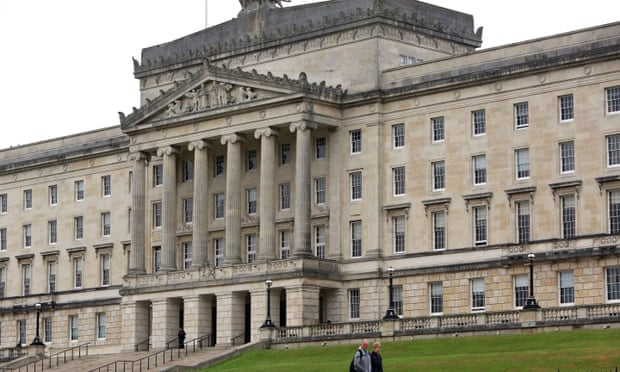The parliament will elect a speaker and nominate ministers to a devolved administration around Saturday lunchtime.
Boris Johnson tweeted on Friday night that the prospect of the assembly and the cross-community executive getting back to work was a “great step forward for the people of Northern Ireland”.
At the core of the deal was a plan by the British and Irish government to create two new “language commissioners” as part of a cultural policy to put Gaelic on the same legal standing as English while protecting Ulster British culture.
The strategy pursued by London and Dublin ministers was a classic combination of carrot and stick. As well as the prospect of nearly £2bn in extra cash for Northern Ireland’s NHS, education system, infrastructure and police, the two governments warned that if parties failed to reach an agreement by Monday there would be fresh elections to a new assembly.
The two main parties, the Democratic Unionist party and Sinn Féin , suffered significant losses in the UK general election, particularly to the centrist Alliance party, which doubled its vote share on 12 December, and a resurgent nationalist SDLP.
This week marked the third year since the devolved power sharing agreement collapsed. Sinn Féin withdrew from the regional government over the DUP’s role in a controversial botched green energy scheme that wasted hundreds of millions of pounds.
But other issues became even greater barriers to the restoration of power-sharing. Sinn Féin’s key demand to re-enter a coalition with the DUP has been for a standalone Irish Language act that would put Gaelic on a par with English.
Unionists opposed such a move but, in an effort to address their concerns, the two governments drew up plans for “an Ulster British language commissioner dealing with Ulster Scots language and associated culture and heritage” as well as a commissioner to deal with Gaelic.
Arlene Foster, the DUP leader and the previous first minister of Northern Ireland before devolved government collapsed in early 2017, described the new deal as “fair and balanced” and said it had addressed unionist fears.
Before the DUP’s ruling executive met in Belfast on Friday night, Foster also said: “I think people will note that while there is a recognition of the facilitation of Irish language, there is also very much a recognition of those of us who are Ulster British and live here in Northern Ireland as well, and there are many mechanisms to strengthen the union.”
Foster pledged to build a better relationship with their traditional enemies in Sinn Féin within the new regional government.
Mary Lou McDonald, Sinn Féin’s leader said: “We now have the basis to restore power sharing, and we’re up for that.” She confirmed that the party would nominate ministers for the new executive this weekend.
McDonald insisted the party was still “committed” to Irish unification, although unionists and the new Tory government have made it clear that a border poll or referendum on Northern Ireland’s constitutional future is not on the agenda.
The main parties came under fire from opponents within their respective communities. The Protestant Orange Order and the hardline Traditional Unionist Voice criticised the DUP for supporting legislation that would give the Irish language special legal status.
But Sinn Féin was also attacked by the dissident republican party Saoradh. Davy Jordan, an ex-republican prisoner and Saoradh chairman, accused Sinn Féin of being “false prophets” who had been “consumed by the very system they claim to oppose.”
Criticism from their bitterest opponents is unlikely to throw either DUP or Sinn Féin off their course towards power-sharing government in Belfast.
On Saturday the DUP will be able to take over three ministries, whileSinn Féin will run two devolved government departments. The SDLP also confirmed that it will enter a multi-party, cross-community coalition, as well the centrist Alliance party. Each party will be entitled to nominate one minister each for the power-sharing executive.
The Ulster Unionist party has yet to decide whether it will join the administration or become the largest opposition force inside the assembly. The UUP did back the New Decade, New Approach document drawn up by the governments to break the political deadlock.
On Friday night the leaders of the four main churches – Catholic, Church of Ireland, Presbyterian and Methodist – welcomed the agreement. “Today is a sign of welcome progress that provides an opportunity for a new start for Northern Ireland’s political institutions and one that can also offer fresh hope,” the leading church figures said.
More about: #NorthernIreland















































